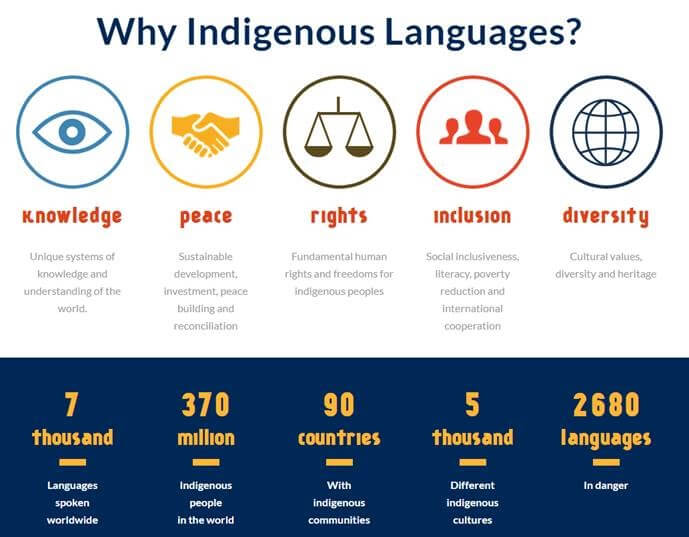Friday Facts: 2019 International Year of Indigenous Languages
Posted on Friday, January 4th, 2019
The United Nations General Assembly proclaimed 2019 as the International Year of Indigenous Languages (IYIL). Currently, 40% of the estimated 6,700 languages spoken around the world are in danger of disappearing. The fact that most of these are Indigenous languages puts the cultures and knowledge systems to which they belong at risk. Here in Canada:
- In 2016, 260,550 Aboriginal people reported being able to speak an Aboriginal language well enough to conduct a conversation.
- The number of Aboriginal people who could speak an Aboriginal language has grown by 3.1% since 2006.
- The number of Aboriginal people able to speak an Aboriginal language exceeded the number who reported an Aboriginal mother tongue. This suggests that many people, especially young people, are learning Aboriginal languages as second languages.
- More than 70 Aboriginal languages were reported in the 2016 Census.
- Speakers of languages in the Algonquian, Inuit and Athabaskan language families accounted for 92.6% of Aboriginal language speakers in Canada.
In addition, Indigenous peoples are often isolated both politically and socially in the countries they live in, by the geographical location of their communities, their separate histories, cultures, languages and traditions. And yet, they are not only leaders in protecting the environment, but their languages represent complex systems of knowledge and communication and should be recognized as a strategic national resource for development, peace building and reconciliation. They also foster and promote unique local cultures, customs and values which have endured for thousands of years. Indigenous languages add to the rich tapestry of global cultural diversity. Without them, the world would be a poorer place. Of particular interest to us here at Algonquin College, we should note that the Truth and Reconciliation Commission Calls to Action number 16 reads “We call upon post-secondary institutions to create university and college degree and diploma programs in Aboriginal languages.”
I invite all of us to find ways to celebrate IYIL2019 to help promote and protect indigenous languages and improve the lives of those who speak them.
- Posted in
- Uncategorized
